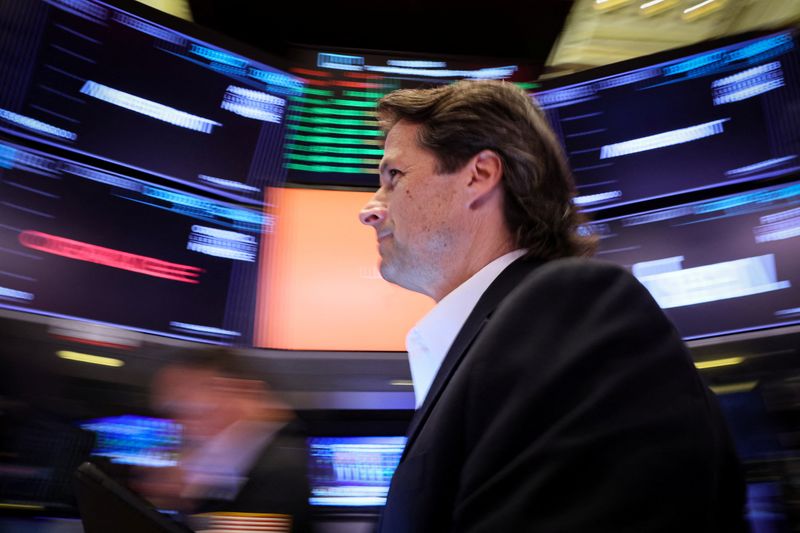By Jamie McGeever
ORLANDO, Florida (Reuters) - To buy back, or not to buy back.
The highest U.S. interest rates in over 20 years coupled with Wall Street's remarkable resilience has brought an old boardroom dilemma into sharp focus: are share buybacks worth it?
Artificial intelligence giant Nvidia clearly thinks so, announcing on Aug. 23 that it will repurchase $25 billion of its shares. Ditto Apple (NASDAQ:AAPL), Chevron (NYSE:CVX), Alphabet (NASDAQ:GOOGL) and Wells Fargo (NYSE:WFC), which this year have announced buybacks of $90 billion, $75 billion, $70 billion and $30 billion, respectively.
These are big numbers, but like everything else related to Wall Street, the underlying dynamics are distorted by Mega Tech: buybacks among S&P 500 companies this year will likely be lower than last year's record $952 billion, according to Refinitiv data, and as a share of the index's overall market cap have been falling since Q1 last year.
This metric as a share of market cap is known as the 'buyback yield'. The average of roughly 400 companies in the main index that have one is around 2.44% and the median is 1.73%, calculates Joe Kleven at YCharts.
For context, Nvidia's $25 billion repurchase represents just over 2% of its market cap, and the firm's longer-term average buyback yield is under 1%. Marathon Petroleum (NYSE:MPC), on the other hand, has a long-term buyback yield of around 20%.
"Buyback yields are quite low, because share prices and market caps are so high. Buybacks are not keeping pace with share value," said Ali Ragih, senior research analyst at VerityData.
U.S. stocks are expensive. Relative to bonds, they are the most expensive in almost 20 years, as shown by the 'equity risk premium' that measures prospective bond yields and equity returns. Nominally, the S&P 500 last week hit its highest level of the year, less than 5% from the January 2022 record high.
All things equal, the more expensive stocks are, the less management may be inclined to buy back. But relative financing costs may also determine their thinking - with equity finance now cheaper relative to new debt in a high interest rate environment, the impulse to retire equity and expand borrowing may be waning.
Figures from Refinitiv show that S&P 500 companies spent more than $6 trillion on stock buybacks in the decade through 2022. Apple accounts for $530 billion of that, and earlier this year announced another $90 billion.
These eye-watering sums beg the question whether the money could not be better spent on developing products, staff or buying and expanding new business.
Ali Ragih at VerityData argues that if you assume returns on investment generally fall with every new project or expansion, companies reach a point where plowing more cash into research and development or capital expenditure just isn't worth it.
"Microsoft (NASDAQ:MSFT) can't do any more M&A, Google can't really hire many more people," he said.
NO HARM DONE ... MOSTLY
A recent study of thousands of U.S. firms' behavior over the course of more than three decades from 1998 to 2020 found that the overall impact of stock buybacks is largely benign.
The study - "Share Repurchases on Trial: Large-Sample Evidence on Share Price Performance, Executive Compensation, and Corporate Investment" - found that, at an aggregate level, repurchasing shares "neither creates nor destroys much wealth (i.e., share price changes) ... (and) they are not associated with excessive CEO pay or underinvestment."
Authors Nicholas Guest at Cornell University, S.P. Kothari at the Massachusetts Institute of Technology and Parth Venkat at the University of Alabama, concluded that buybacks return several hundred billion dollars of capital to shareholders every year and are a mainstream financial avenue open to companies "that for the most part do not harm the overall market."
From a shareholders' perspective, evidence suggests companies that are more active in buying back their shares have an edge over the broader market. Just.
S&P Global (NYSE:SPGI)'s Buyback Index is an equally weighted index that measures the performance of the top 100 stocks in the S&P 500 with the highest buyback ratios.
It has outperformed the main index in six of the last 10 years up to and including 2022, underperformed in three, and was neck and neck in 2017.
But $1 invested in the main index a decade ago would be worth more today than $1 invested in the Buyback Index, with the gap really opening up in the early days of the pandemic in 2020.
So far this year, the wider index's price gains and total returns are roughly double those of the Buyback Index, according to S&P Global figures up to July 31.
If buybacks do slow, will companies sit on their cash while short-term interest rates are so high? Or with long-term real returns also the highest in years, will they invest in longer-term, growth-boosting expansion plans?
(The opinions expressed here are those of the author, a columnist for Reuters.)
(This story has been refiled to restore dropped words in paragraph 11)
(By Jamie McGeever)
